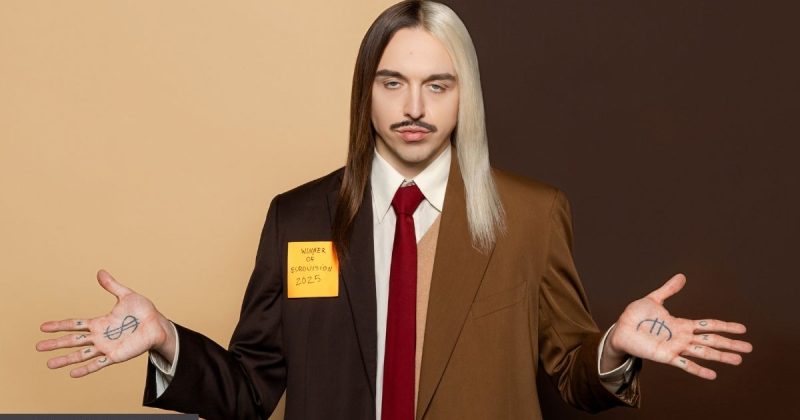
From failures to history-making success: The dramatic story of Austria at Eurovision, marked by determination and three wins – Udo Jürgens, Conchita Wurst, and JJ.
In May 2026, Austria will be at the center of worldwide attention as it hosts the 70th edition of the Eurovision Song Contest – celebrating the rich legacy of an event that began in 1956. After more than a decade, the competition returns to Austria, energized by the outstanding opera singer JJ, who captivated audiences and won first place at Eurovision 2025 with his hit “Wasted Love“.
Austria’s Early Days at Eurovision (1957–1968)
Austria first joined Eurovision in 1957, but its debut proved challenging – Bob Martin, with the song “Wohin, kleines Pony”, finished in last place. Following several middling performances, Austria turned to Israeli singer Carmela Corren to represent the country in 1963 with “Vielleicht geschieht ein Wunder”. Although Corren was the first Israeli to compete at Eurovision, she too delivered an average result for the Austrians – 7th place.
Undoubtedly, one of Austria’s most iconic figures at Eurovision is Udo Jürgens, who competed three years in a row starting in 1964. His songs “Warum nur warum?” and “Sag ihr, ich lass sie grüßen” secured impressive placements (6th and 4th respectively), but the pinnacle came in 1966 with “Merci, Chérie”, earning Austria its first victory and turning Jürgens into a star. In 1968, he returned as a composer with the song “Tausend Fenster”, performed by Czech singer Karel Gott – the entry reached only 13th place.
Austria’s Peak Moments in the 1970s
Between 1969 and 1975, Austria’s participation was sporadic but significant. In 1971, Marianne Mendt stood out with “Musik”, performed in authentic Viennese dialect, adding local flair to the contest. The following year, rock band The Milestones achieved fifth place with “Falter im Wind”. The band Schmetterlinge, in 1977, which two of it’s members were part of The Milestones, representing Austria in 1972, delivered an unforgettable performance, noted for creative costumes featuring backward-facing masks and the unique song “Boom Boom Boomerang” – which referenced Australian icons like kangaroos and the didgeridoo. Despite the memorable act, the song placed only 17th out of 18.
Prominent Austrian Artists of the 1980s
The 1980s were marked by key performances from Austrian artists like Gary Lux, who appeared at Eurovision as a member of Westend and as a solo artist in several contests (1983, 1985, and 1987), and also served as a backing singer three more times. Another significant figure was Thomas Forstner, who finished fifth at the 1989 Eurovision in Switzerland with “Nur ein Lied” – one of Austria’s best results of the decade. Austria’s 1990 entry, “Keine Mauern mehr”, performed by Simone, powerfully captured the spirit of the times, referencing the fall of the Berlin Wall.
Eurovision in the 1990s and Early 2000s
In the 1990s, Tony Wegas represented Austria two years in a row, blending Udo Jürgens’ style into his entries. Unlike Jürgens, Wegas achieved average outcomes in 1992 and 1993. In May 2003, comedian Alf Poier drew attention with his humorous and critical song, accompanied by stage props such as animal figures. Poier’s success with a comical number – contrasting with other unsuccessful Austrian songs – led to further experimentation and artistic diversity in subsequent contests.
The mid-2000s introduced unique acts, such as “Y así” by Global Kryner, which fused Alpine folk-pop, and Eric Papilaya’s 2007 “Get a Life – Get Alive”, the official song of the Life Ball in Vienna, a charity for people living with HIV and AIDS. Despite its positive message, the song was criticized, and Austria’s national broadcaster, ORF, announced a withdrawal from the contest starting in 2008. The decision stemmed from the belief that, with Eurovision’s current format relying solely on tele-voting, Austria had little chance of success.
Renewal and New Achievements (2011–2025)
Austria’s Eurovision comeback followed Germany’s 2010 victory, which provided fresh inspiration. In 2011, Nadine Beiler reached the final with her emotional ballad “The Secret Is Love”. A landmark moment arrived with Conchita Wurst’s internally selected entry in 2014, marking a new era for Austria at Eurovision. The momentum continued with Cesár Sampson’s third-place finish in 2018 with “Nobody but You”. Most recently, Austria celebrated another impressive victory thanks to JJ’s captivating performance of “Wasted Love“.
Austria at Eurovision 2025
JJ, is the opera singer who represented Austria at Eurovision 2025 with the song “Wasted Love”, following his internal selection by the national broadcaster ORF. JJ clinched first place at Eurovision after receiving 436 points in the grand final – 258 from the professional juries, ranking first, and 178 from the televote, ranking fourth.
JJ’s victory marks Austria’s third win in Eurovision history, following the triumphs of Udo Jürgens in 1966 with the song “Merci, Chérie”, and Conchita Wurst in 2014 with the song “Rise Like a Phoenix”.
Eurovision 2025: This was Austria’s 57th participation in Eurovision. Austria joined the competition in 1957 and has won three times over the years. Austria’s previous victory was in Eurovision 2014 with the song “Rise Like a Pheonix” performed by singer Conchita Wurst.

Email: [email protected]
Phone: +972-50-9441919
Ilay Gaist is a leading Israeli content creator and writer specializing in the Eurovision Song Contest. He is a well-known commentator with extensive expertise in the contest’s history, rules, and dynamics. His passion for Eurovision drives him to deliver rich, professional, and innovative content to his audience.
Ilay holds a bachelor’s degree in Arabic and has a multilingual background. He also engages in cultural research, with a particular focus on global culinary traditions and the evolution of local cuisines around the world.








